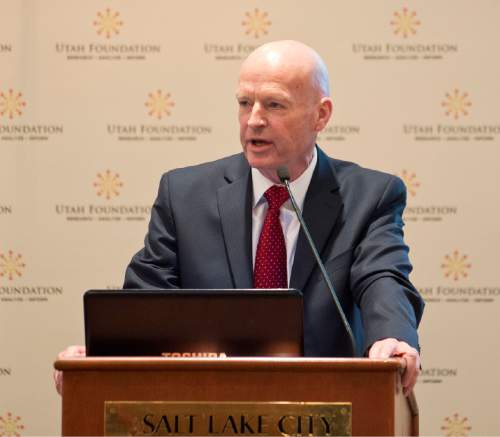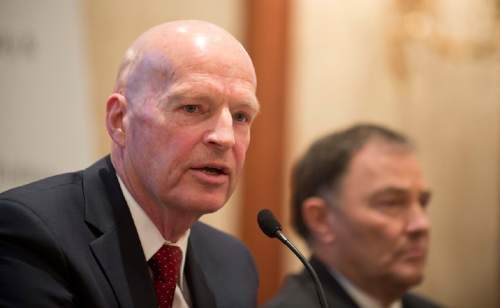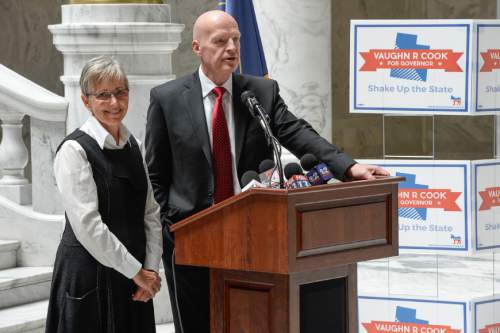This is an archived article that was published on sltrib.com in 2016, and information in the article may be outdated. It is provided only for personal research purposes and may not be reprinted.
Utah's Democratic gubernatorial candidates agreed on almost everything in their first debate Monday, especially that it's time for Utah to break up the near-monopoly Republicans have held on elective office in the state for decades.
"It's time for a change in the state," Vaughn Cook said during the debate, sponsored by the Utah Women's Democratic Club. "It's time to retire our Republican hegemony. It's time to retire our Republican governor."
Michael Weinholtz said he believes that the Republican Party today doesn't represent mainstream Utahns, who he believes are far more moderate and independent-minded than the GOP candidates they elect.
Weinholtz said he was running because he believes he's the best person for the job, "but I also intend to run against the one-party system [that] serves the needs of special interests instead of average Utahns."
Cook agreed with the one-party-state criticisms, saying too often Utahns vote based on two myths — one, that Republicans are more aligned with their views and, two, that Republicans are more aligned with the views of The Church of Jesus Christ of Latter-day Saints.
"Too often, people in Utah look at Democrats as scary and immoral," Cook said, but they don't realize their friends and neighbors are Democrats. "The older you get, the more Democratic you become. You get wiser, and you become more compassionate."
Weinholtz and Cook agreed the Republican power structure in Utah is botching a series of issues — public education funding, clean air, economic development and management of public lands among them.
The two are vying to win the nomination at the Utah Democratic Party convention on Saturday. If neither wins 60 percent of the delegate vote, they will move to a primary election in June. Neither has sought to gather the 28,000 signatures they needed to assure a spot on the primary ballot.
Cook said the Utah Legislature has put public schools on a "system of starvation," essentially jailing kids in classrooms and testing "how little we can feed them before they die." It has made it impossible to hire and retain quality teachers, and most Utahns, he said, would support a tax increase if the money went to education.
They agreed that Utah should fully expand Medicaid to help more than 100,000 low-income Utahns get access to health care. Last session, the Legislature passed a bill to cover about 16,000 of the poorest of the poor Utahns, focusing on those with mental-health or addiction issues, those who were recently released from jail, and the chronically homeless.
Weinholtz said that was essentially the Legislature creating a "death panel" to decide which Utahns will get access to life-saving health care and which ones won't. "It's morally bankrupt and fiscally irresponsible," he said.
Both said Utah Republican lawmakers are wasting time and money pursuing a lawsuit demanding the federal government turn over control of more than 30 million acres of land within the state's borders. Cook called it an "exercise in futility," and Weinholtz said lawmakers had to search for attorneys who would tell them what they wanted to hear.
"It's a classic example of ideology run amok," Weinholtz said. "This is only being pushed by a very small group of Republicans and largely by real estate developers and oil companies. They're the only people who are going to benefit from this."
Both support legislation that would legalize medical marijuana. Cook, who said he is trained in Eastern medicine, believes marijuana can be used to treat illnesses, but the state should not approve recreational use. Weinholtz said the Legislature's rejection of medical marijuana is "another example of our Legislature not listening to our people."
The two candidates differed slightly on what should be done to improve Utah's lagging wages. Weinholtz said he would support legislation that would establish a statewide living wage, while Cook said he would not. Cook said that, when he started his business 12 years ago, he couldn't have afforded to pay his employees the higher, living wage being sought in some states and cities.
"I'm in favor of paying people more," he said. "But we have to have policies that are sensitive to the entrepreneurs who create jobs in the state. We don't want to put them out of business. We don't want to squash initiative because we create a burden that is too high to achieve."
Cook and Weinholtz created businesses in the medical field.
Cook founded ZYTO, a medical software company based in Lindon that employees about 60 people. Weinholtz founded CHG Healthcare, the largest medical staffing company in the United States.
Twitter: @RobertGehrke











